NEWS from Asia and the Pacific
IMF Encourages a More Balanced Global Economic Architecture at G20 Meeting in Fukuoka
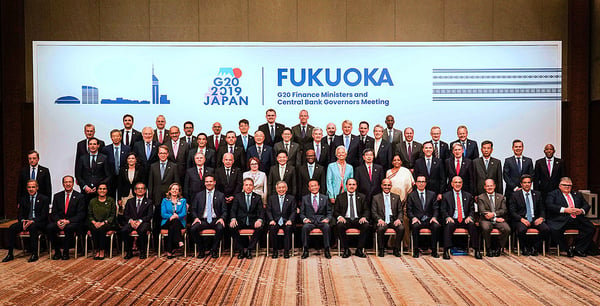
June 10, 2019, Fukuoka, Japan – As the G20 finance ministers reaffirmed their commitment to work for “strong, sustainable, balanced and inclusive growth” at the G20 Finance Ministerial Meeting in Fukuoka, International Monetary Fund (IMF) Managing Director Christine Lagarde took a lead role in the discussions and encouraged a global economic architecture anchored on stronger cooperation and multilateralism.
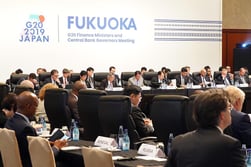 The IMF helped set the tone of this year’s meeting by issuing its regular Surveillance Note on the G20 economic outlook and by the Managing Director writing in her associated blog about the need to resolve the current trade tensions to support global growth. Prior to the ministerial meeting, she wrote that the US-China tariffs, including those implemented last year, could reduce global GDP by 0.5 percent, or about US$455 billion, an amount larger than South Africa’s economy. Ms. Lagarde underscored that protectionist measures only hurt growth, and called for a more open, stable and transparent trade system.
The IMF helped set the tone of this year’s meeting by issuing its regular Surveillance Note on the G20 economic outlook and by the Managing Director writing in her associated blog about the need to resolve the current trade tensions to support global growth. Prior to the ministerial meeting, she wrote that the US-China tariffs, including those implemented last year, could reduce global GDP by 0.5 percent, or about US$455 billion, an amount larger than South Africa’s economy. Ms. Lagarde underscored that protectionist measures only hurt growth, and called for a more open, stable and transparent trade system.
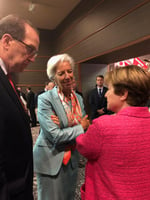
During the meeting, finance ministers voiced concerns over spillovers of the US-China trade tensions, sharing the sentiment that the global economy may be stabilizing but that the outlook remains precarious and with risks tilted to the downside. In their communique issued at the end of the two-day meeting, the ministers highlighted the risk of intensified “trade and geopolitical tensions” and stressed that they “stand ready to take further action” to mitigate risks. Ms. Lagarde also issued a statement reiterating that resolving the current trade tensions should be the first priority.
The ministers also agreed to compile common rules by 2020 for global taxation of internet giants like Facebook and Google, and to address global current account imbalances and challenges brought by demographic changes, including population aging.
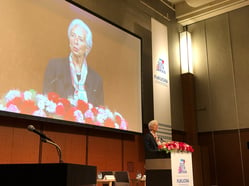 Prior to the ministerial meeting, Ms. Lagarde attended a high-level seminar “Our Future in the Digital Age” where she delivered the keynote speech on financial innovation. “Fintech can cut the cost of utilizing financial tools and enable millions to fulfill their aspirations of building a better life,” she said to an invited audience.
Prior to the ministerial meeting, Ms. Lagarde attended a high-level seminar “Our Future in the Digital Age” where she delivered the keynote speech on financial innovation. “Fintech can cut the cost of utilizing financial tools and enable millions to fulfill their aspirations of building a better life,” she said to an invited audience.
Presenting the main findings from an IMF-World Bank survey, she said that fintech can be a tool for financial inclusion to close the gender gap in the formal economy and that fintech can foster more international cooperation in cybersecurity, anti-money laundering and payment systems, but that fintech also might lead to oligopoly by big tech firms which could offer financial products based on big data and artificial intelligence (AI). “This presents a unique systemic challenge to financial stability and efficiency,” she said. “We have to find a way to preserve financial stability and integrity, protect consumers, and increase financial literacy.”
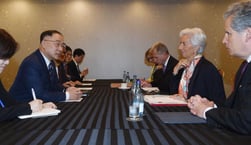
Ms. Lagarde also spent her time fostering dialogue with member countries. She met with finance ministers and central bank governors from Argentina, South Korea, South Africa and the UK to discuss the state of the global economy as well as their efforts to stabilize economic growth with policy adjustments.
 During her stay in Fukuoka, Ms. Lagarde enjoyed Japan’s traditional horse-back archery, yabusame, and other traditional performances presented by the host city.
During her stay in Fukuoka, Ms. Lagarde enjoyed Japan’s traditional horse-back archery, yabusame, and other traditional performances presented by the host city.
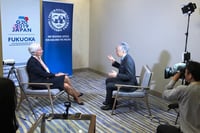
In addition to the official agenda of the G20 meeting, Ms. Lagarde also gave an interview to the Nikkei group to reach out to the Japanese audience. During the interview, she sent a strong message that male corporate leaders should utilize the talented female labor force to strengthen the Japanese economy, in addition to sharing her diagnosis on the global economy and the future of fintech.
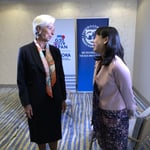 After the group interview, she talked with Ms. Shoko Habu, chief editor of Nikkei’s web magazine for working women, and discovered that they had attended the same university in Aix-en-Provence in southern France, known as the town of lavender. The discovery evolved from a talk on the lavender color of her jacket. “I didn’t prepare to say I went to the same school – it was just an improvisation. I was very excited about chatting with her like that,” Ms. Habu said afterward.
After the group interview, she talked with Ms. Shoko Habu, chief editor of Nikkei’s web magazine for working women, and discovered that they had attended the same university in Aix-en-Provence in southern France, known as the town of lavender. The discovery evolved from a talk on the lavender color of her jacket. “I didn’t prepare to say I went to the same school – it was just an improvisation. I was very excited about chatting with her like that,” Ms. Habu said afterward.

Ms. Lagarde left Fukuoka following the conclusion of the meeting, thanking Japanese Finance Minister Taro Aso and Bank of Japan Governor Haruhiko Kuroda for their leadership in making the ministerial meeting a success. She also commended the people of Fukuoka for their hospitality and for presenting their rich history and demonstrating their unique culture at the exhibition booths in the venue. “We’re very proud of hosting this large international event in our city,” said a female volunteer from a local university. “Through the training for volunteers, we’ve rediscovered our city. We wished to see Mdm. Lagarde here and introduce many things about Fukuoka as she is a global role model for us women.”
Ms. Lagarde is scheduled to return to Japan to attend the G20 Summit in Osaka from 28-29 June.


